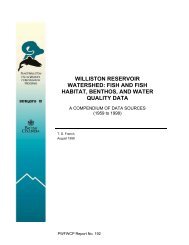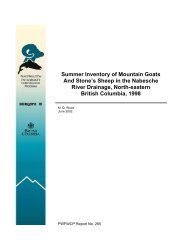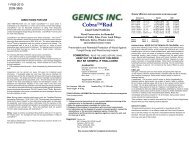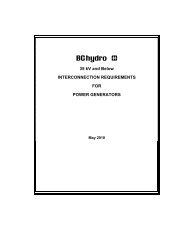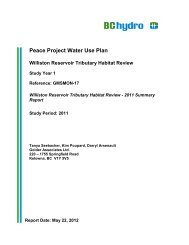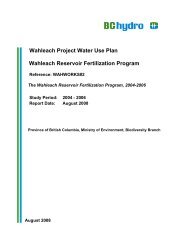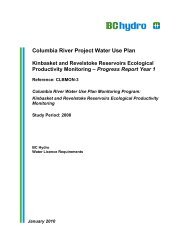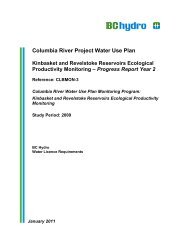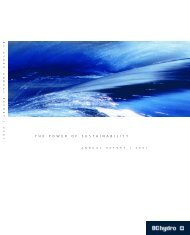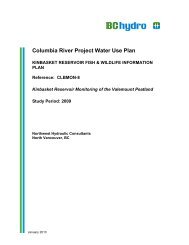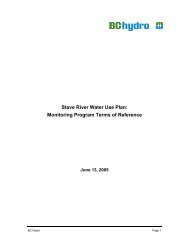BC Hydro > Financial Information Act Return (to March 31, 2007)
BC Hydro > Financial Information Act Return (to March 31, 2007)
BC Hydro > Financial Information Act Return (to March 31, 2007)
You also want an ePaper? Increase the reach of your titles
YUMPU automatically turns print PDFs into web optimized ePapers that Google loves.
notes <strong>to</strong> consoliDateD <strong>Financial</strong> stateMents<br />
For the years enDeD <strong>March</strong> <strong>31</strong>, <strong>2007</strong> anD 2006<br />
note 1: signiFicant accounting policies<br />
Purpose<br />
9 8<br />
2 0 0 7 B C H Y D R O A N N U A L R E P O R T<br />
F I N A N C I A L R E S U L T S<br />
British Columbia <strong>Hydro</strong> and Power Authority (<strong>BC</strong> <strong>Hydro</strong>) was established in 1962 as a Crown corporation of the Province of British Columbia (the<br />
Province) by enactment of the <strong>Hydro</strong> and Power Authority <strong>Act</strong>. As directed by the <strong>Hydro</strong> and Power Authority <strong>Act</strong>, <strong>BC</strong> <strong>Hydro</strong>’s mandate is <strong>to</strong><br />
generate, manufacture, distribute and supply power. <strong>BC</strong> <strong>Hydro</strong>’s corporate purpose is <strong>to</strong> provide “Reliable power, at low cost, for generations.”<br />
<strong>BC</strong> <strong>Hydro</strong> is subject <strong>to</strong> regulation (see Note 2) by the British Columbia Utilities Commission (the Commission) which, among other things, approves<br />
the rates <strong>BC</strong> <strong>Hydro</strong> charges for its services.<br />
<strong>BC</strong> <strong>Hydro</strong> owns and operates electric generation and distribution facilities in the Province of British Columbia. <strong>BC</strong> <strong>Hydro</strong> also owns transmission<br />
facilities in the province of British Columbia that are operated by British Columbia Transmission Corporation (<strong>BC</strong>TC), an independent Crown<br />
corporation of the Province.<br />
Consolidation<br />
The consolidated financial statements include the accounts of <strong>BC</strong> <strong>Hydro</strong> and its principal wholly-owned operating subsidiaries Powerex Corp.<br />
(Powerex), Powertech Labs Inc., <strong>BC</strong>H Services Asset Corp., and Columbia <strong>Hydro</strong> Construc<strong>to</strong>rs Ltd. All intercompany transactions and balances are<br />
eliminated upon consolidation.<br />
Use of Estimates<br />
Management of <strong>BC</strong> <strong>Hydro</strong> has made a number of estimates and assumptions relating <strong>to</strong> the reporting of assets and liabilities and <strong>to</strong> the disclosure of<br />
contingent assets and liabilities <strong>to</strong> prepare these consolidated financial statements in conformity with Canadian generally accepted accounting<br />
principles (GAAP). <strong>Act</strong>ual results could differ from these estimates.<br />
Regula<strong>to</strong>ry Accounting<br />
<strong>BC</strong> <strong>Hydro</strong> is regulated by the Commission, and they are both subject <strong>to</strong> general or special directives and directions issued by the Province. <strong>BC</strong> <strong>Hydro</strong><br />
operates primarily under a cost of service regulation as prescribed by the Commission. Orders in Council from the Province establish the basis for<br />
determining <strong>BC</strong> <strong>Hydro</strong>’s equity for regula<strong>to</strong>ry purposes, as well as its allowed return on equity and the annual Payment <strong>to</strong> the Province. Calculation<br />
of its revenue requirements and rates charged <strong>to</strong> cus<strong>to</strong>mers are established through applications filed with and approved by the Commission.<br />
<strong>BC</strong> <strong>Hydro</strong> applies various accounting policies that differ from Canadian GAAP for enterprises that do not operate in a rate-regulated environment<br />
(see Note 2). Generally, these policies result in deferral and amortization of costs and recoveries <strong>to</strong> allow for adjustment of future rates. In the<br />
absence of rate-regulation, these amounts would otherwise be included in the determination of net income in the year the amounts are incurred.<br />
These accounting policies support <strong>BC</strong> <strong>Hydro</strong>’s regulation and have been established through ongoing application by approval of the Commission.<br />
Revenues and Energy Costs<br />
Domestic revenues comprise sales <strong>to</strong> cus<strong>to</strong>mers within the province of British Columbia, and sales of firm energy outside the province under<br />
long-term contracts that are reflected in <strong>BC</strong> <strong>Hydro</strong>’s domestic load requirements. Other sales outside the province are classified as trade.<br />
Trade revenues and energy costs include the effects of using commodity derivatives. The impacts on trading transactions of realized and unrealized<br />
gains and losses resulting from changes in fair value are reflected on a net basis.<br />
Revenue is recognized on the basis of billing cycles and also includes accruals for electricity deliveries not yet billed.



